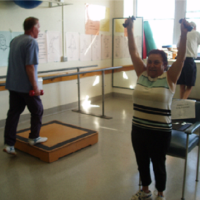
Review authors wanted to know if exercise training improves exercise tolerance, quality of life, or symptoms, and if it reduces the number of future flare-ups ('exacerbations'), for people with bronchiectasis compared to people who did not do exercise training. They looked at studies involving adults and children with stable disease and patients in the period following a recent flare-up.
Dr Christian Osadnik said "Exercise training plays an important role in the management of bronchiectasis. Evidence in this review suggests exercise can help adults with stable disease walk considerably further and feel better (i.e. improved quality of life), albeit our certainty in the evidence is low. Important knowledge gaps exist regarding the role of exercise following acute exacerbations and in children." Read the review here.
Studies included in the review
We included six studies with a total of 275 participants; five studies were related to people with stable disease. No studies involving children were found. Exercise training was delivered in combination with other treatments such as airway clearance therapy, respiratory muscle training, and/or education. Participants were randomly assigned to exercise training or no exercise training. Exercise training was performed for at least six weeks, either in a group setting or at home. None of the included studies were funded by companies with commercial interests in study findings.
Key results
- Following completion of exercise training, participants in a stable clinical state:
- walked farther than those who did not do exercise training (an average of 87 metres farther), but certainty of the evidence is low.
- reported improved quality of life (low-certainty evidence) and less shortness of breath and fatigue.
- We found evidence of moderate certainty showing that exercise training might not specifically improve cough-related symptoms, although the incidence of acute exacerbations was lower.
- Evidence was insufficient to show if the effects of exercise training would last beyond the period of exercise training
- No evidence was available to determine whether exercise training helps people become physically active.
- No benefits were observed for people who undertook exercise training soon after an acute flare-up of their bronchiectasis.
Due to inadequate reporting of methods, small study numbers, and variation between study findings, evidence is of very low to moderate certainty. Limited evidence is available to show longer-term effects of exercise training on these outcomes.
What is bronchiectasis?
People with bronchiectasis suffer from chronic cough and sputum production. They have increased risk of developing acute exacerbations that contribute to poor exercise tolerance and quality of life. When performed by people with other chronic lung conditions, exercise training improves exercise tolerance and reduces symptoms. However, little is understood about the effect of exercise training specifically in bronchiectasis.
The evidence is current up to October 2020.
The full review can be found here.
This summary is based on the abstract and plain language summary and was prepared by Emma Dennett.
